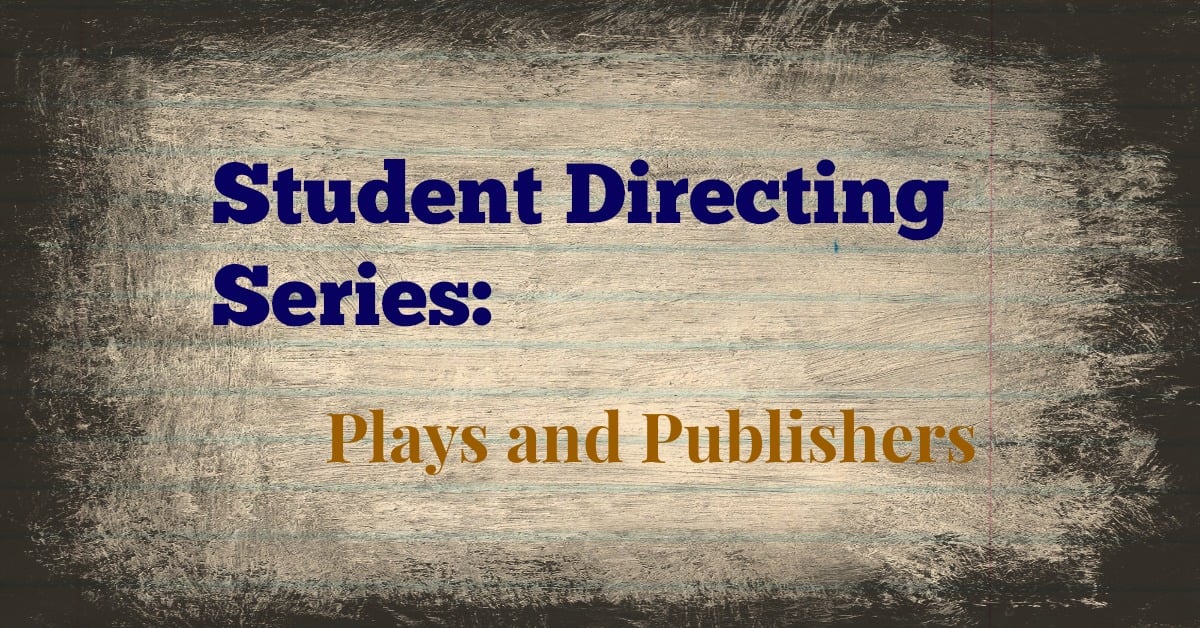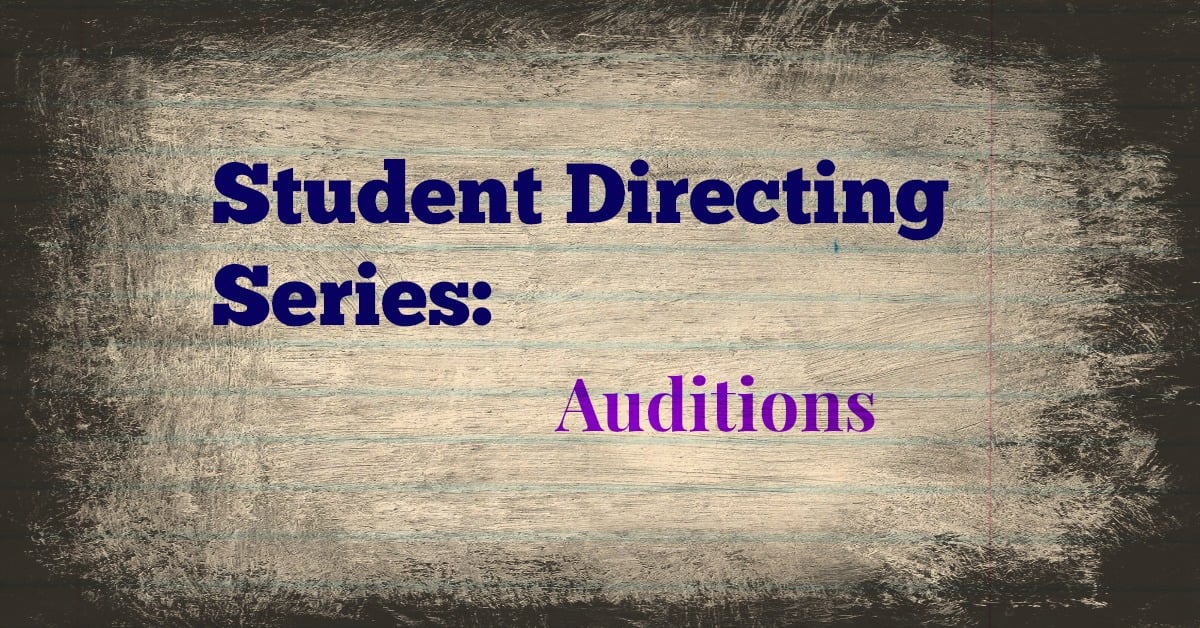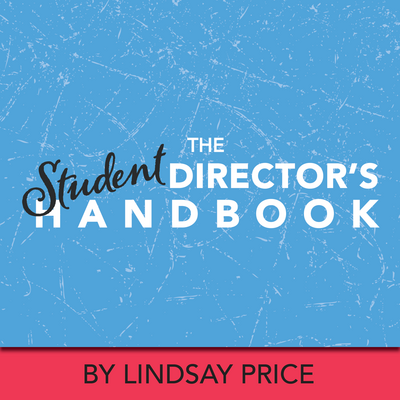Student Directing Series: Plays and Publishers
Many senior drama classes have a student directing project. The best way to learn the process is to dive in, but where do you start?
- How do you find a play?
- Is there a budget for royalties?
- How do I find out how much a play costs?
- How do you approach a publisher?
- What if you don’t like the play?
In Part One of the Student Directing Series we will look at choosing a play and approaching a publisher.
Choosing a Script
How do I choose a script to direct?
Your first task is choose a play. That means reading scripts. Hopefully your teacher will have a library of scripts you can peruse. Also, a number of companies (including ours at www.theatrefolk.com) allow you to read free sample pages from their scripts online. Avoid choosing a play based on the description. It’s hard to know what a play is like from a couple of lines of text. Don’t end up with a play you don’t like because of a misstep in the choosing process.
There are thousands and thousands of plays out there. Set the parameters of your search to avoid being overwhelmed. Discuss with your teacher the criteria for your project. If your cast size is limited to four, don’t look at scripts with casts of ten. If your royalty budget is $50 a performance, there’s no point reading plays that are $70 a performance.
Set the parameters of your search:
- Size of cast
- Length of Play
- Sets available
- Props and costumes available
- Budget for royalties
Once you have the parameters set, read plays with a director’s eye. You’re not looking for plays you want to act in. You’re looking for plays you can visualize and that spark a vision. What does this mean?
Visualization
The director takes words on the page and makes them three-dimensional. The director tells a story visually – by creating pictures and by creating action. If you can visualize a play as you’re reading it, if you can see moments in your head, on a stage, that’s a good sign. When you read a play, what do you see? What do you visualize?
Vision
A director must have a specific vision for their play. What does that mean? In theatrical terms, a vision is a concept, an interpretation. The vision is going to shape the look and feel of the play. The vision is going to affect how the audience responds to the play. It is what makes your take on the play unique.
How do I define my vision?
Determine the main themes of the play, your point of view on those themes, and how will you visualize your point of view.
Why do I need a vision?
Knowing your vision is how you will make every aspect of the production come to life. Your vision joins everyone together. It will guide your choices as you discuss the play with your actors and direct their action. If you’re lucky enough to have designers, your vision will guide their choices as well. Every decision, every question, every element in your play (e.g. costumes, make-up, props) can be selected through the lens of your vision. What is your vision for the play?
Exercise
Watch three movies by well-known directors with varying styles: Steven Spielberg, Tim Burton, and Alfred Hitchcock, for example. Watch the movie with a director’s eye. What is the director’s vision? What is the theme of the movie, what is the director’s point of view, and how has that been visualized? Compare and contrast the three movie directors.
Research & Costs
When you choose a play, you’re going to want to do some research on the cost of producing it. Part of your selection process should involve gathering this information.
What information do you need to produce this play?
- How much does it cost to buy scripts for your cast?
- Are there only hard copies available or can you purchase a photocopy license?
- What are the royalties? Are there different royalties for class projects?
Most publishers post this information online. If you received a budget ahead of time from your teacher, make sure that the play you want to produce fits within that budget. Otherwise, you may have to choose another play.
Play Proposal Sheet
When you’ve chosen a script and you have gathered all the information about costs, it’s time to present the play to your teacher. Fill out a Play Proposal Sheet to show to your teacher. It is a summary of your vision, your groundwork, and demonstrates how your chosen play will fit the established parameters.
The most important question to answer is this: Why you want to direct the play? What interests you? What (beyond getting a good grade) makes you want to present this particular play to an audience? Be specific.
You can download a blank play proposal sheet, along with a PDF copy of this article at the end of this post.
Approaching a Publisher
You’re going to have to approach a publisher to obtain scripts and royalty rights. This is true even if your audience is non-paying. This should be your job, not your teacher’s. Here is how you should not approach a publisher:
I WANT TO DIRECT A PLAY, THX!!!!!!!
Neither is this:
Hi! I’m doing this play as part of my senior director project and I need some scripts and I’m doing the show once, is that ok????? Thxs! I really appreciate it!!!!!
You may feel you’re just being friendly. This may be the way you communicate with your friends. But when you’re assuming the role of the director, you want to be taken seriously. Treat this situation as if you were really producing the play.
Five steps to take to secure scripts and rights:
- Have all your information for the play at hand.
- What is the title?
- How many scripts do you need? Or are you getting a photocopy license?
- How many performances are you giving?
- What are the dates of the performances?
- What is the size of your theatre?
- Know the procedure.
- You may have to register with a company before you can place an order. You may have to fax in information from your school. Check with the publisher well in advance about their ordering process to avoid disappointment.
- Apply in the right spot.
- You’re going to be applying for amateur or nonprofessional rights. Make sure you get the right application.
- Know your billing info
- Know the name of your school and your teachers full name.
- The address, the phone/fax/email
- Know the method of payment and have it available.
- Be sensitive to time
- Some publishers are slower than others to approve performances. Do not frantically email a publisher the day before your rehearsals start. Be aware that you may not hear back from a publisher right away, and be aware that things take time to come through the mail. Treat the process professionally.
You have your play, you have your vision, you have your scripts and royalties secured. You’re on your way to directing. The next entry in this series will deal with working with your peers. How do you get other students to take you seriously as a director?
The Student Director's Handbook
by Lindsay Price
Help students take their show from first audition to opening night with The Student Director’s Handbook. This easy-to-use ebook is full of guidelines, tips and templates designed to help students create a vision, circumvent problems and organize rehearsals on their way to a successful production.
The Rehearsal Companion
by Kerry Hishon
You’ve chosen the play, paid the royalties, done the script analysis, held your auditions, and cast the show. Tomorrow is the first rehearsal. Are you ready? Really ready? The Rehearsal Companion can help!





